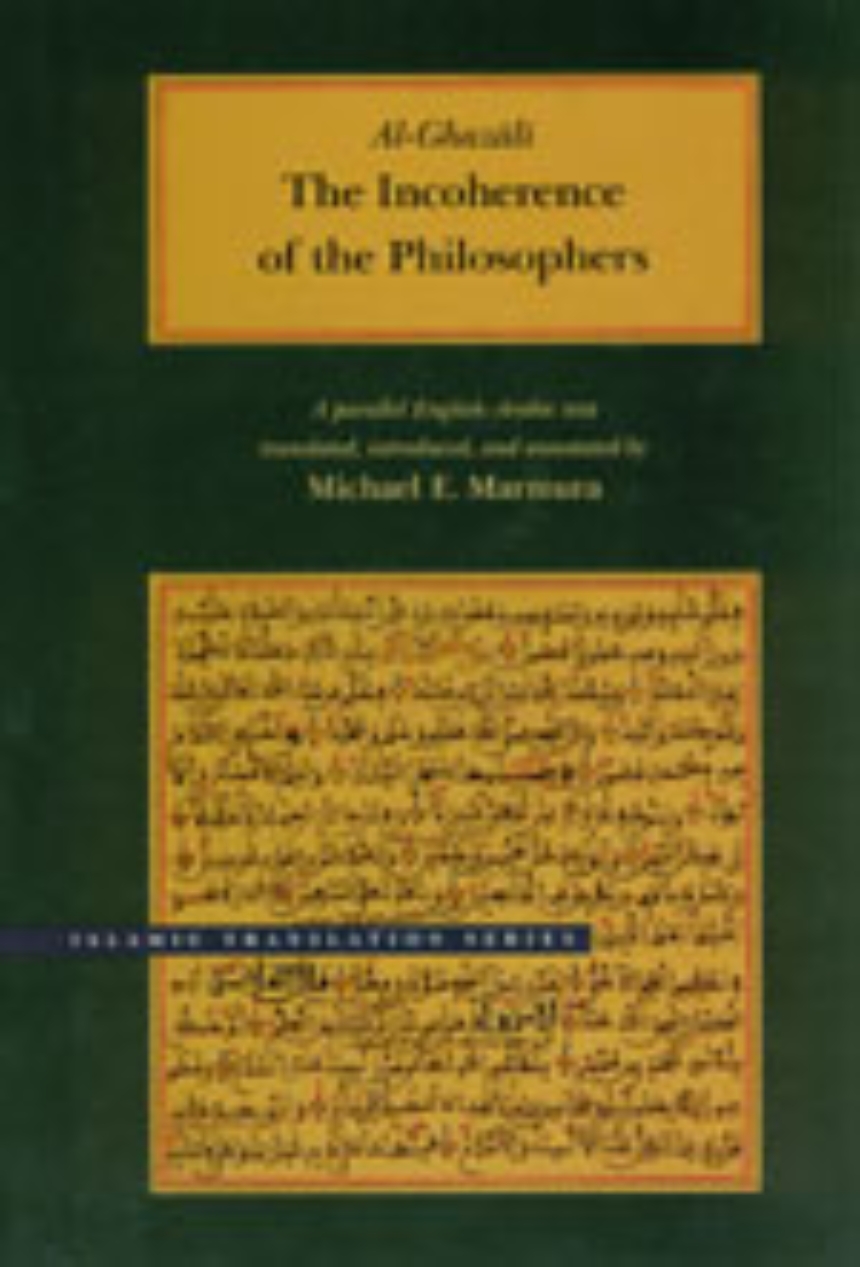Distributed for Brigham Young University
The Incoherence of the Philosophers, 2nd Edition
2nd Edition
Although Abu Hamid Muhammad al-Ghazali lived a relatively short life (1058-1111), he established himself as one of the most important thinkers in the history of Islam. The Incoherence of the Philosophers, written after more than a decade of travel and ascetic contemplation, contends that while such Muslim philosophers as Avicenna boasted of unassailable arguments on matters of theology and metaphysics, they could not deliver on their claims; moreover, many of their assertions represented disguised heresy and unbelief. Despite its attempted refutation by the twelfth-century philosopher Ibn Rushd, al-Ghazali’s work remains widely read and influential.
301 pages | 6 x 9 | © 2000
Brigham Young University - Islamic Translation Series
Philosophy: History and Classic Works
Table of Contents
Foreword
Acknowledgments
Translator’s Introduction – English
Translator’s Introduction – Arabic
Author’s Introduction: [The religious preface]
[A first] introduction
[A second] introduction
[A third] introduction
[A fourth] introduction
[Author’s table of contents]
Part One
1. Discussion: On refuting their doctrine of the world’s past eternity
The [philosophers’] first [proof]
[The philosophers’] second proof...
[The philosophers’] third proof...
[The philosophers’] fourth proof
2. Discussion: On refuting their statement on the post-eternity of the world, time, and motion
3. Discussion: On showing their obfuscation in saying that God is the world’s enactor and maker...
Regarding the first [aspect]
The second aspect
The third aspect
4. Discussion: On showing their inability to prove the existence of the Maker of the world
5. Discussion: On showing their inability to prove that God is one...
6. Discussion: [On the divine attributes]
7. Discussion: On refuting their statement that the First cannot share with another in terms of genus...
8. Discussion: On refuting their statement that the existence of the First is simple...
9. Discussion: On showing their inability to sustain a proof that the First is not a body
10. Discussion: On their inability to show that the world has a maker and a cause
11. Discussion: On showing the impotence of those among them who perceive that the First knows other[s] and knows the genera and species in a universal way
12. Discussion: On showing their inability to prove that He also knows Himself
13. Discussion: On refuting their statement that God... does not know the particulars divisible in terms of temporal division into what is, what was, and what will be
14. Discussion: On their inability to set a proof [to show] that heaven is an animal that obeys God... through its circular motion
15. Discussion: On refuting what they mentioned concerning the purpose that moves heaven
16. Discussion: On refuting their statement that the souls of the heavens know all the particulars that occur in this world...
Part Two: The Natural Sciences
[Introduction]
17. Discussion: [On causality and miracles]
18. Discussion: On their inability to sustain a rational demonstration [proving] that the human soul is a self-subsistent spiritual substance...
The first [proof]
A second proof
A third proof
A fourth proof
A fifth proof
A sixth proof
A seventh proof
An eighth proof
A ninth proof
A tenth proof
19. Discussion: On refuting their statement that it is impossible for human souls to undergo annihilation...
20. Discussion: On refuting their denial of bodily resurrection...
The Book’s Conclusion
Notes to the English Text
Notes to the Arabic Text
Index
Acknowledgments
Translator’s Introduction – English
Translator’s Introduction – Arabic
Author’s Introduction: [The religious preface]
[A first] introduction
[A second] introduction
[A third] introduction
[A fourth] introduction
[Author’s table of contents]
Part One
1. Discussion: On refuting their doctrine of the world’s past eternity
The [philosophers’] first [proof]
[The philosophers’] second proof...
[The philosophers’] third proof...
[The philosophers’] fourth proof
2. Discussion: On refuting their statement on the post-eternity of the world, time, and motion
3. Discussion: On showing their obfuscation in saying that God is the world’s enactor and maker...
Regarding the first [aspect]
The second aspect
The third aspect
4. Discussion: On showing their inability to prove the existence of the Maker of the world
5. Discussion: On showing their inability to prove that God is one...
6. Discussion: [On the divine attributes]
7. Discussion: On refuting their statement that the First cannot share with another in terms of genus...
8. Discussion: On refuting their statement that the existence of the First is simple...
9. Discussion: On showing their inability to sustain a proof that the First is not a body
10. Discussion: On their inability to show that the world has a maker and a cause
11. Discussion: On showing the impotence of those among them who perceive that the First knows other[s] and knows the genera and species in a universal way
12. Discussion: On showing their inability to prove that He also knows Himself
13. Discussion: On refuting their statement that God... does not know the particulars divisible in terms of temporal division into what is, what was, and what will be
14. Discussion: On their inability to set a proof [to show] that heaven is an animal that obeys God... through its circular motion
15. Discussion: On refuting what they mentioned concerning the purpose that moves heaven
16. Discussion: On refuting their statement that the souls of the heavens know all the particulars that occur in this world...
Part Two: The Natural Sciences
[Introduction]
17. Discussion: [On causality and miracles]
18. Discussion: On their inability to sustain a rational demonstration [proving] that the human soul is a self-subsistent spiritual substance...
The first [proof]
A second proof
A third proof
A fourth proof
A fifth proof
A sixth proof
A seventh proof
An eighth proof
A ninth proof
A tenth proof
19. Discussion: On refuting their statement that it is impossible for human souls to undergo annihilation...
20. Discussion: On refuting their denial of bodily resurrection...
The Book’s Conclusion
Notes to the English Text
Notes to the Arabic Text
Index

